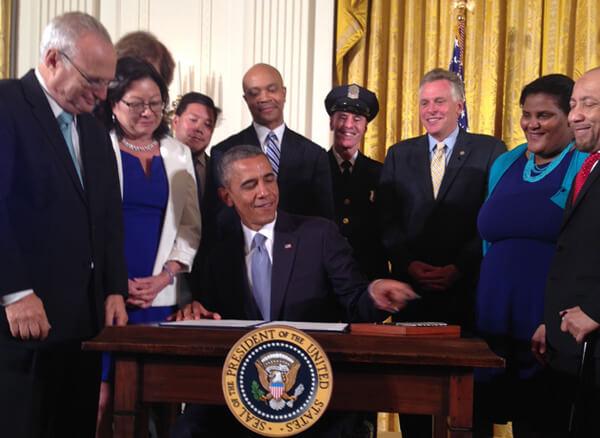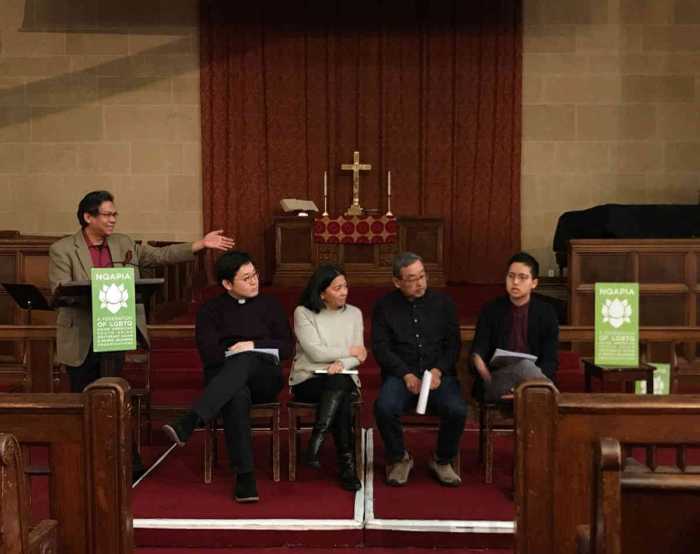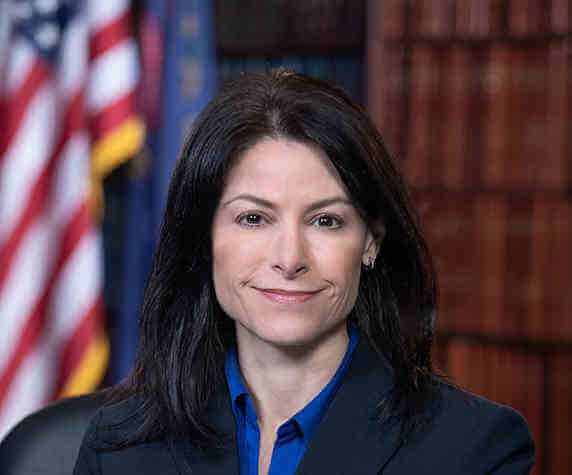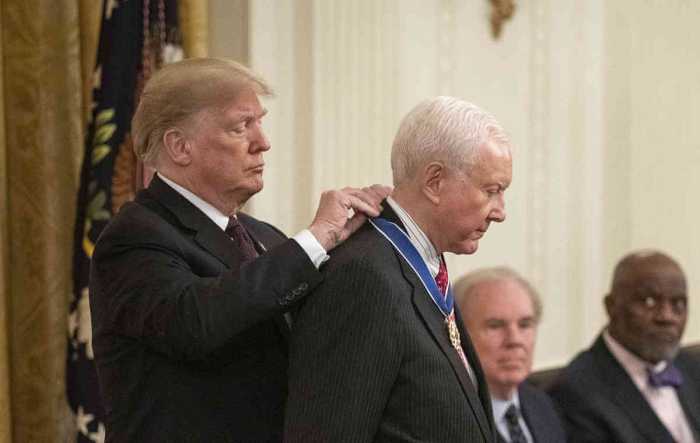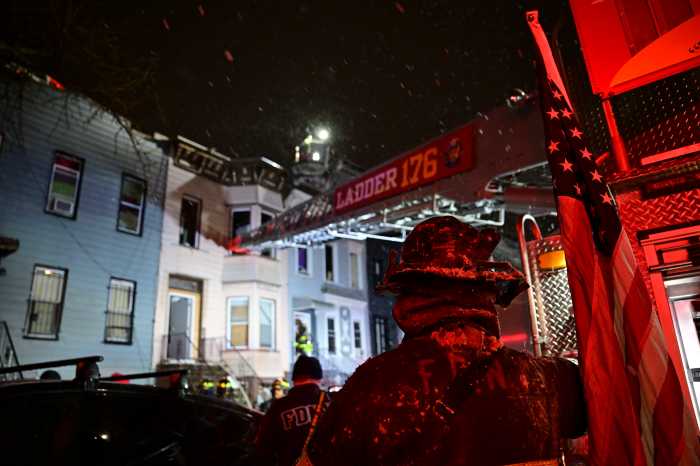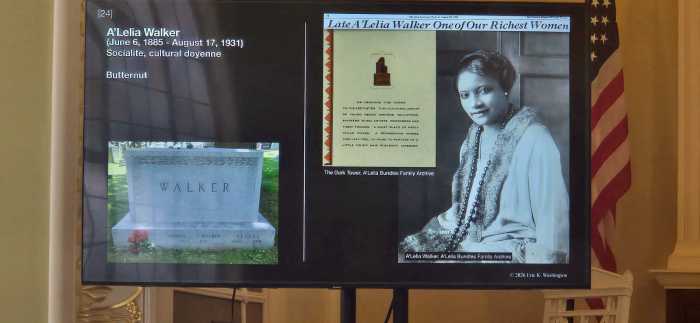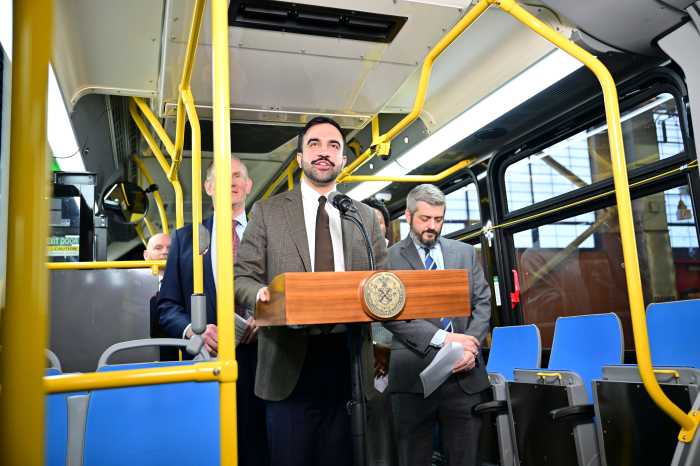President Barack Obama signs his executive order barring anti-LGBT discrimination by federal contractors. | COURTESY: TOBIAS BARRINGTON WOLFF
When White House officials went public on July 18 with news that President Barack Obama would, three days later, issue his executive order barring sexual orientation and gender identity discrimination by the federal government, advocates were cheered by word that no religious exemptions would be added to the terms of a longstanding executive order prohibiting discrimination on other grounds, including race, religion, and sex. In the weeks leading up to the president’s action, he faced calls from religious conservatives and congressional Republicans to condition his order on the right of at least some contractors to opt out based on their religious beliefs regarding homosexuality.
Obama’s decision to resist these demands, however, does not definitively take the religious exemption issue off the table. From a 2002 amendment President George W. Bush made to the existing contractor nondiscrimination executive order, first issued by Lyndon Johnson, to the recent Supreme Court ruling in the Hobby Lobby case, there are factors that keep alive the question of whether the nondiscrimination protections for LGBT employees of federal contractors will be absolute.
The Obama order, signed on the morning of July 21, amended EO 11246, which Johnson put in place in September 1965, just a few months after Title VII of the 1964 Civil Rights Act went into effect. The Johnson order charged the Labor Department with overseeing a program under which “government contracting agencies” would require contractors to agree not to discriminate in employment based on race, color, religion, sex, or national origin, the categories of discrimination barred by Title VII. Contractors are generally required to include similar provisions in any subcontracts they make as part of their obligation to the government. The penalties for noncompliance include cancellation or suspension of the contract and ineligibility for future contracts.
Hobby Lobby decision, Bush’s 2002 executive order amendment raise thorny problems
The president lacks the unilateral authority to create laws that can be enforced in federal court by individual plaintiffs –– such as those who face discrimination from contractors. As a result, complaints about noncompliance are handled administratively. The Labor Department investigates complaints and can refer violations of federal statutes to the appropriate enforcement agencies, such as the Equal Employment Opportunity Commission (EEOC). However, given that sexual orientation is not a protected category under federal law, the EEOC cannot act on complaints of anti-gay discrimination. Instead, the Labor Department must handle them in its contract compliance procedures. (During the Obama administration, the EEOC and other federal agencies first began to treat gender identity employment discrimination claims as sex discrimination, which is a protected class under Title VII.)
In 2002, Bush amended the Johnson executive order to provide that “this Order shall not apply to a Government contractor or subcontractor that is a religious corporation, association, educational institution, or society, with respect to the employment of individuals of a particular religion to perform work connected with the carrying on by such corporation, association, educational institution, or society of its activities.” In all other respects, Bush’s order stipulated, such contractors must play by the same rules as everyone else.
Obama’s action on July 21 did not tamper with the Bush order, so religiously-affiliated contractors find themselves in an ambiguous position. On one hand, the Obama order requires them to agree not to discriminate in employment based on sexual orientation or gender identity. On the other hand, would it be plausible for them to argue they cannot recognize a gay person as a member in good standing of their faith, regardless of that person’s professed beliefs? Who gets to decide, for example, whether an individual professing to be Catholic who is also openly gay can be denied employment by a Catholic social welfare agency under contract to the federal government because the agency does not deem an openly gay person to be a practicing Catholic?
Under the First Amendment, faith organizations are generally free from government interference in their religious activities, and they enjoy what is known as a “ministerial exemption” regarding the employment of not only clergy but also others who carry out their religious mission –– even if there is no bright line spelling out precisely what jobs qualify under that exemption. The Supreme Court, however, has held that no organization has a constitutional right to refuse to comply with laws of general application not enacted to single out a religious practice for prohibition.
The high court issued its key decision about the requirement that religious congregations comply with laws of general application in 1990. Three years later, in response, Congress passed the Religious Freedom Restoration Act (RFRA), providing that people with religious objections to laws of general application could claim a religious exemption unless the government could demonstrate a compelling interest that could not be achieved in any less restrictive way. Many states followed suit with similar laws placing the same restrictions on their own legislative and regulatory authority.
RFRA suddenly took on a high profile last month when the Supreme Court, ruling on Hobby Lobby’s objections to the contraceptive coverage mandate in the Affordable Care Act, found that the company qualified as a “person” under the 1990 statute –– eligible to claim a religious exemption –– due to the fact that it was a closely-held, family-owned enterprise. The contraceptive coverage which the federal government identified as a compelling interest, the court found, could be provided in a way less restrictive of Hobby Lobby’s religious beliefs –– for example, directly by the government itself.
The high court’s Hobby Lobby ruling raised immediate fears about whether corporations owned or operated by individuals with religious objections to homosexuality or to same-sex marriage might claim exemptions from employing or serving gay people or same-sex couples. In her dissenting opinion, Justice Ruth Bader Ginsburg cited two cases in which state courts had rejected claims of religious exemption from public accommodations laws –– by a Minnesota health club, which did not want to have gay members, and by a New Mexico wedding photographer, who had rejected business from a lesbian couple celebrating a commitment ceremony. The New Mexico Supreme Court found that the state’s version of RFRA was not violated by applying the state’s public accommodations law to a small business of this type.
A health club and a wedding photographer are not the sorts of businesses likely to contract with the federal government, but the nature of the problem is clear from these situations.
Under the terms of Obama’s order, for example, could a closely-held, family-owned company that produces a technology or provides consulting services the federal government wants to buy insist that for religious reasons it cannot employ gay people, or more particularly cannot continue to employ gay people who marry their same-sex partners? (Recent news reports have chronicled Catholic schools that employed gay people as teachers and administrators for many years suddenly terminating them after learning they married a same-sex partner.) Could a federal contractor refuse to include the same-sex spouse of an employee in its workplace benefits plan on the same-basis that it includes different-sex spouses because of religious objections to same-sex marriage?
EO 11246, as amended on July 21 by Obama, would probably say no. But if a contractor sought protection from the nondiscrimination requirement under RFRA, how would it fare?
These questions are difficult to answer prospectively. In his majority opinion in the Hobby Lobby case, Justice Samuel Alito insisted the court was ruling only on the case before it, focusing on the religious objections by closely-held, family-owned businesses to providing contraception coverage, a requirement for which non-profit religiously-affiliated organizations had already been accorded exemptions by the Obama administration. The court, he asserted, did not purport to establish a wide-ranging exception to all legal obligations for all business corporations.
Specifically, Alito commented that an employer could not rely on its religious beliefs to seek exemption from the race discrimination requirements of Title VII. But did he intend to suggest that the RFRA exemption would not extend to any discrimination claims? Ginsburg was clearly concerned he did not mean to say that. And, in that context, in addition to the Minnesota health club and the New Mexico photographer, she could also have cited the Supreme Court’s decision in Boy Scouts of America v. Dale, where the majority found that the group’s First Amendment freedom of expression and association rights took priority over whatever interest the State of New Jersey had in forbidding public accommodations like the Boy Scouts from discriminating based on sexual orientation.
What would the Supreme Court majority think about the relative weight of an executive order banning sexual orientation or gender identity discrimination as opposed to statutory protection for free exercise of religion in RFRA? Under the nation’s constitutional scheme, statutes would logically outweigh executive orders when there is a conflict between the two. Can a presidential executive order that is not effectuating a policy adopted by Congress –– as the Johnson order was when it applied to categories protected under the 1964 Civil Rights Act –– signify a compelling government interest, or does Congress have the sole authority to establish compelling government interests?
Religious opponents of the new Obama executive order have warned it is going to lead to litigation, and they are likely not making empty threats. Some contractor who loses or fails to obtain government business because they will not comply, on religious grounds, with the nondiscrimination requirement will almost certainly go to court seeking injunctive relief, and the question will be squarely presented whether RFRA applies to the situation or if instead Obama’s order appropriately identified a compelling government interest that cannot be achieved in any less restrictive way.

